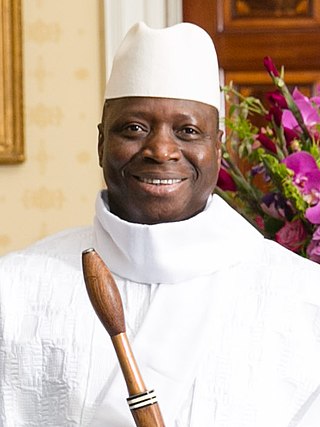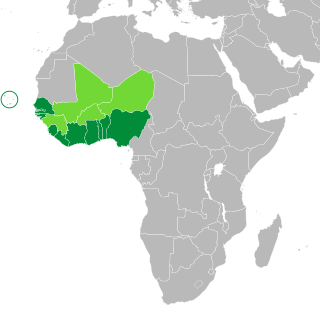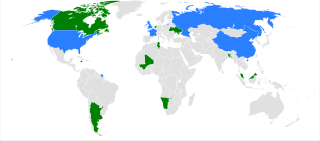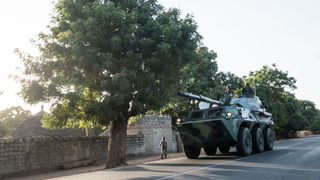Related Research Articles

The Gambia, officially the Republic of the Gambia, is a country in West Africa. Geographically, The Gambia is the smallest country in continental Africa; it is surrounded by Senegal on all sides except for the western part, which is bordered by the Atlantic Ocean.

Politics of The Gambia takes place within the framework of a presidential republic, whereby the President of The Gambia is both head of state and head of government, and of a multi-party system. Executive power is exercised by the government. Legislative power is vested in both the government and parliaments.

The first written records of the region come from Arab traders in the 9th and 10th centuries. In medieval times, the region was dominated by the Trans-Saharan trade and was ruled by the Mali Empire. In the 16th century, the region came to be ruled by the Songhai Empire. The first Europeans to visit the Gambia River were the Portuguese in the 15th century, in 1447, who attempted to settle on the river banks, but no settlement of significant size was established. Descendants of the Portuguese settlers remained until the 18th century. In the late 16th century, English merchants attempted to begin a trade with the Gambia, reporting that it was "a river of secret trade and riches concealed by the Portuguese."

The Gambia Armed Forces, also known as the Armed Forces of The Gambia, consists of three branches: the Gambia National Army (GNA), the Gambia Navy, and the Republican National Guard (RNG). It formerly included the Gambia National Gendarmerie (GNG) from the 1980s to 1996, when they were moved under the jurisdiction of the Ministry of the Interior. The commander-in-chief is the president of the Gambia who is currently Adama Barrow, whereas practical control is exercised by the Chief of the Defence Staff who is currently Lieutenant General Yankuba Drammeh.

The United Nations Monitoring, Verification and Inspection Commission (UNMOVIC) was created through the adoption of United Nations Security Council resolution 1284 of 17 December 1999 and its mission lasted until June 2007.

Yahya Abdul-Aziz Jemus Junkung Jammeh is a Gambian politician and military dictator who overthrew the elected government and became President of the Gambia from 1996 to 2017, as well as Chairman of the Armed Forces Provisional Ruling Council (AFPRC) from 1994 to 1996.

The United Nations Mission in Sierra Leone (UNAMSIL) was a United Nations peacekeeping operation in Sierra Leone from 1999 to 2006. It was created by the United Nations Security Council in October 1999 to help with the implementation of the Lomé Peace Accord, an agreement intended to end the Sierra Leonean civil war. UNAMSIL expanded in size several times in 2000 and 2001. It concluded its mandate at the end of 2005, the Security Council having declared that its mission was complete.

The Economic Community of West African States Monitoring Group (ECOMOG) was a West African multilateral armed force established by the Economic Community of West African States (ECOWAS). ECOMOG was a formal arrangement for separate armies to work together. It was largely supported by personnel and resources of the Nigerian Armed Forces, with sub-battalion strength units contributed by other ECOWAS members — Ghana, Guinea, Sierra Leone, The Gambia, Liberia, Mali, Burkina Faso, Niger, and others.

The United Nations Integrated Mission in East Timor (UNMIT) was established on 25 August 2006 by UN Security Council Resolution 1704. Its objectives are "to support the Government in consolidating stability, enhancing a culture of democratic governance, and facilitating political dialogue among Timorese stakeholders, in their efforts to bring about a process of national reconciliation and to foster social cohesion". In its most recent resolution on UNMIT, the Council extended its mandate until 26 February 2012. UNMIT and ISF troops left the country at the end of 2012.

Hassan Bubacar Jallow is a Gambian judge who has served as Chief Justice of the Gambia since February 2017. He was the Prosecutor of the International Criminal Tribunal for Rwanda (ICTR) from 2003 to 2016, and the Prosecutor of the International Residual Mechanism for Criminal Tribunals (IRMCT) from 2012 to 2016, both at the rank of United Nations Under Secretary-General. He served as Minister of Justice and Attorney General from 1984 to 1994 under President Dawda Jawara.

The 1997 United Nations Security Council election was held on 14 October 1997 at United Nations Headquarters in New York City during the 52nd session of the United Nations General Assembly. The General Assembly elected five non-permanent members of the UN Security Council for two-year terms commencing on 1 January 1998.

The 1999 United Nations Security Council election was held on 14 October 1999 during the Fifty-fourth session of the United Nations General Assembly, held at United Nations Headquarters in New York City. The General Assembly elected Bangladesh, Jamaica, Mali, Tunisia, and Ukraine, as the five new non-permanent members of the UN Security Council for two-year mandates commencing on 1 January 2000. Notably, Ukraine was elected to the Council for the first time as an independent nation.

Bilateral relations exist between Australia and Senegal.

Adama Barrow is a Gambian politician and real estate developer who has served as President of the Gambia since 2017.

A constitutional crisis occurred in Gambia following presidential elections in December 2016, in which challenger Adama Barrow achieved an upset victory over longtime incumbent Yahya Jammeh. It eventually concluded after a military intervention by the Economic Community of West African States (ECOWAS) led to Jammeh's departure from the country.

The ECOWAS military intervention in the Gambia or the ECOWAS Mission in The Gambia – initially code-named Operation Restore Democracy – is a military intervention in The Gambia by several member states of the Economic Community of West African States.

United Nations Security Council Resolution 2337 was a measure unanimously adopted by the United Nations Security Council (UNSC) on 19 January 2017. It expressed support for efforts by ECOWAS to peacefully resolve the 2016–2017 Gambian constitutional crisis, calling on President Yahya Jammeh to step down and allow a peaceful transition to the President-elect, Adama Barrow, as well as supporting the African Union and ECOWAS decisions in recognizing Adama Barrow as the new president. The measure was adopted by a vote of 15 supporting, none opposed, and none abstained.

Aja Fatoumata C.M. Jallow-Tambajang is a Gambian politician and activist who served as Vice-President of the Gambia and Minister of Women's Affairs from February 2017 to June 2018, under President Adama Barrow.
The following lists events in the year 2017 in the Gambia.
Gambia is a member of the United Nations. The Gambia gained independence from the United Kingdom in 1965, becoming a sovereign member state of the Commonwealth of Nations. Dawda Jawara served as the country's first Prime Minister. Muhammadou M.O. Kah is the Ambassador Extraordinary and Plenipotentiary of the Gambia to Switzerland and Permanent representative to United Nations Office at Geneva, WTO and other International Organisations in Switzerland.
References
- ↑ "Presidents of the Security Council : 1990-1999" Archived October 18, 2012, at the Wayback Machine , UN.org.